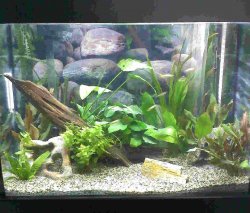AeolidGal
New Member
- Joined
- Dec 28, 2011
- Messages
- 5
- Reaction score
- 0
I just got a 37 Gallon tank for Christmas. I've had a 10 gallon tank for about 3 months, I study biology, and absolutely love fish.
I got the tank at a local pet shop that is family owned and they really care about their pets. Not one of those crummy places where everything is half alive and decrepit. I also plan to get all of my fish and plants from them in the future. I do trust their judgment. I am just a little curious about this salt thing.
My tank is planted with live plants, has a sandy to medium fine gravel, some drift wood, and a couple large rock structures.
The owner of the pet shop keeps all of his tanks with some salt ~1 Tbs per 10 Gallons. The water in this area is fairly hard and at pH 8.2
All of the fish at the shop are healthy and active and the plants look great too. They test the water for free and so far everything is going well.
I started my tank with 6 Danios. I am not worried about being ripped off or the owner trying to get money by selling me salt. I also want to keep my fish in an environment as close to the one to which they've been acclimatized. However, after reading some info about adding salt to freshwater tanks many people are adamantly opposed to it.
I haven't decided on what other fish to add once the tank is established but I do want to have it operate as close to a natural ecosystem as possible.
I am open to any tips, ideas, and advice since I am new to this and I do not want to cause any unnecessary stress to my fish.
Thanks!!
I got the tank at a local pet shop that is family owned and they really care about their pets. Not one of those crummy places where everything is half alive and decrepit. I also plan to get all of my fish and plants from them in the future. I do trust their judgment. I am just a little curious about this salt thing.
My tank is planted with live plants, has a sandy to medium fine gravel, some drift wood, and a couple large rock structures.
The owner of the pet shop keeps all of his tanks with some salt ~1 Tbs per 10 Gallons. The water in this area is fairly hard and at pH 8.2
All of the fish at the shop are healthy and active and the plants look great too. They test the water for free and so far everything is going well.
I started my tank with 6 Danios. I am not worried about being ripped off or the owner trying to get money by selling me salt. I also want to keep my fish in an environment as close to the one to which they've been acclimatized. However, after reading some info about adding salt to freshwater tanks many people are adamantly opposed to it.
I haven't decided on what other fish to add once the tank is established but I do want to have it operate as close to a natural ecosystem as possible.
I am open to any tips, ideas, and advice since I am new to this and I do not want to cause any unnecessary stress to my fish.
Thanks!!



 I learn better from experience and nowadays would use 'waspeze' for stings but not if it was really bad like i had it that time.
I learn better from experience and nowadays would use 'waspeze' for stings but not if it was really bad like i had it that time.
